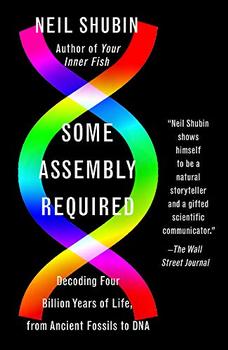Summary | Excerpt | Reviews | Beyond the book | Read-Alikes | Genres & Themes | Author Bio

A Guide for Occupants
by Bill BrysonMany of Bill Bryson's fans first became familiar with his work through his autobiographical travel books, such as Notes from a Small Island or A Walk in the Woods: Rediscovering America on the Appalachian Trail. Bryson also famously delved into the world of science in A Short History of Nearly Everything, which breaks down scientific fields such as chemistry and biology so that the lay person finds them fascinating and entertaining. The Body: A Guide for Occupants marks the author's reentry into popular science. With his characteristic wit, he takes his readers on a survey of anatomy that successfully outlines what makes us human.
Bryson begins with a brief examination of what chemically makes up a person, and then he drills down to the workings of specific body parts and systems, such as the head or the digestive system. He later touches on the less physical aspects of being human, from sleep to sexuality, and he ends by considering how our bodies ultimately break down. While there is some order to the book's structure, with overarching chapters like "The Head," "The Guts" and "Nerves and Pain," each of these is wide ranging and encompasses an amazing range of subjects tangentially related to the main focus.
Bryson is a master at making arcane information accessible to a broad audience and keeping that audience engrossed from start to finish. Every page is jam-packed with interesting trivia that is fun to share with others. I constantly found myself turning to my husband and saying, "Huh—here's something cool—let me read you this paragraph!" The material Bryson presents ranges from obscure facts about the body (we blink about 14,000 times a day, so much that a person's eyes are closed for 23 minutes of every waking day) to things that make sense that most people just haven't thought about (unlike other organs of the body, the skin never fails) to intriguing bits of history that are not well known (the modern species of penicillin is descended from a single moldy cantaloupe).
What keeps the book from being a dry recitation of anatomy trivia is Bryson's light touch with the subject matter; he injects the text with wit at every turn:
"Many authorities (for which possibly read 'science majors who don't have a date on a Friday') have tried at various times, mostly for the purposes of amusement, to compute how much it would cost in materials to build a human."
"It's a little ironic that two of the lightest things in nature, oxygen and hydrogen, when combined form one of the heaviest [water], but that's nature for you."
"Incidentally, the idea that we use only 10 percent of our brains is a myth…You may not use it all terribly sensibly, but you employ all your brain in one way or another."
"You are 70% more likely to die from heart disease today than you were in 1900. That's partly because other things used to kill people first, and partly because a hundred years ago people didn't spend five or six hours an evening in front of a television with a big spoon and a tub of ice cream."
For more trivia about the body see Beyond the Book.
The downside to The Body is that there's no overarching narrative that ties all the fascinating parts together. There's consequently nothing to keep one reading "just one more chapter" late into the night, and there's simply too much information to absorb to move quickly through the book. This is a slow read, and one designed for sharing but not necessarily discussing or debating; it likely would not make a good selection for a book group.
Regardless, Bryson very likely has another hit on his hands. I've read everything he has written and believe it to be far and away his best work to date. It will certainly appeal to his ever-growing fan base and delight anyone who enjoys acquiring new information about a topic they think they know well; it would also make an ideal gift book for the trivia lover.
![]() This review was originally published in The BookBrowse Review in November 2019, and has been updated for the
February 2021 edition.
Click here to go to this issue.
This review was originally published in The BookBrowse Review in November 2019, and has been updated for the
February 2021 edition.
Click here to go to this issue.

If you liked The Body, try these:

by Cat Bohannon
Published 2025
The real origin of our species: a myth-busting, eye-opening landmark account of how humans evolved, offering a paradigm shift in our thinking about what the female body is, how it came to be, and how this evolution still shapes all our lives today

by Neil Shubin
Published 2021
The author of the best-selling Your Inner Fish gives us a lively and accessible account of the great transformations in the history of life on Earth--a new view of the evolution of human and animal life that explains how the incredible diversity of life on our planet came to be.
Your guide toexceptional books
BookBrowse seeks out and recommends the best in contemporary fiction and nonfiction—books that not only engage and entertain but also deepen our understanding of ourselves and the world around us.